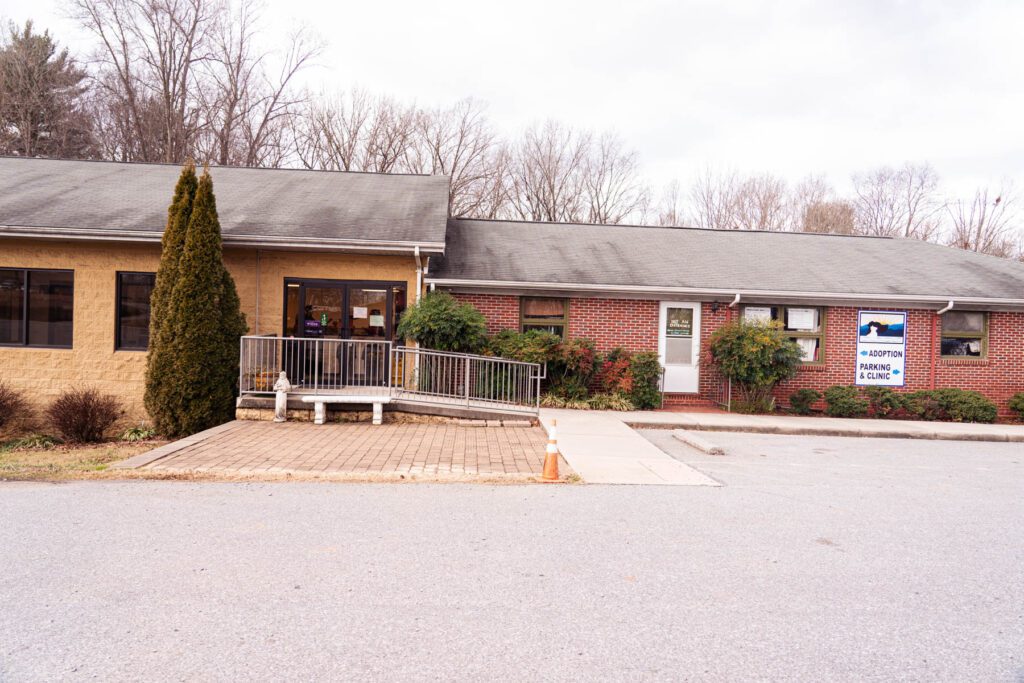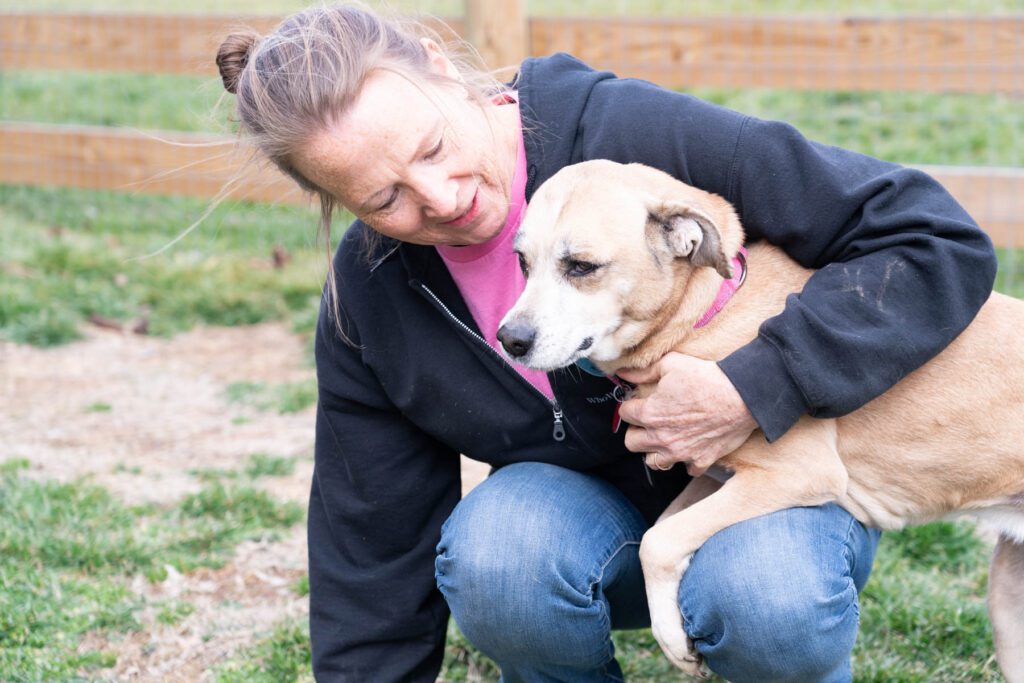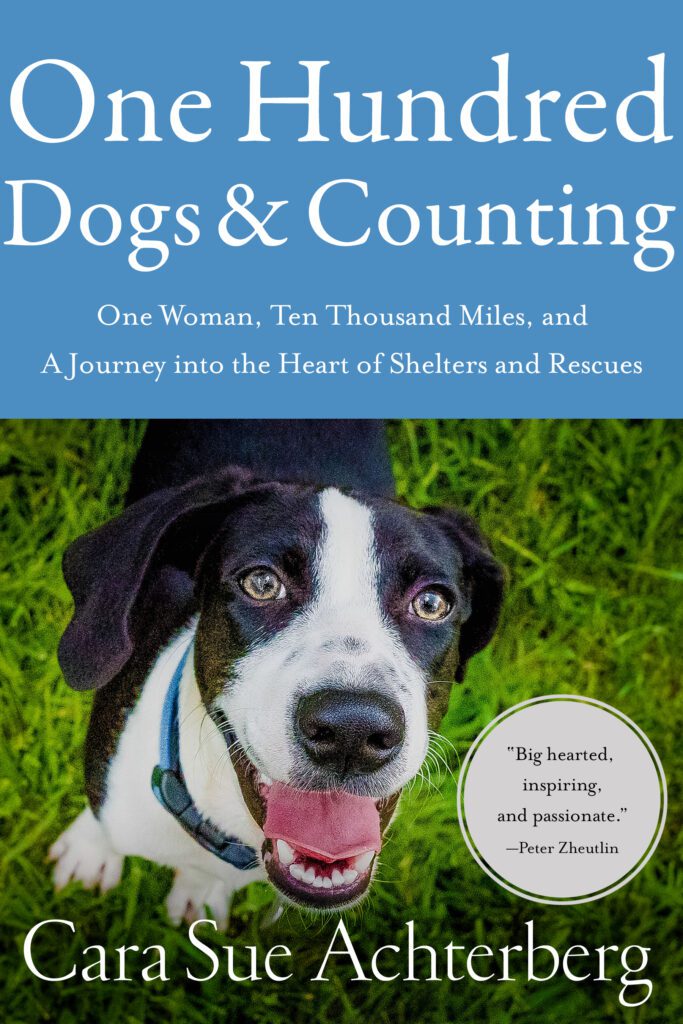Franklin County Humane Society Planned Pethood & Adoption Center (FCHS) is quite the intentional mouthful, but its wordy name explains it all. Humane care, advocating and offering planned pethood, and adopting out animals.
The nonprofit shelter and clinic located about 45 minutes east of Roanoke houses 198 animals (significantly more cats than dogs). It was formerly an extended rancher but has been converted into cat rooms and dog ‘dens’, adoption center, and vet clinic.

With the departure of their most recent directory, Anita, a trio of committed staff have stepped into the roles of co-directors. Jennifer, Cera, and Christina lead a staff of about fifteen in the adoption center and another five or six in the clinic area.



Weather permitting, during the day the dogs are moved to outdoor kennels where they can enjoy the fresh air, and they are rotated in groups through the expanded play space on the hillside behind the shelter. While we were visiting two committed volunteers who come every day to walk the dogs were taking a steady stream of dogs out to walk on the wooded trail behind the shelter.





Christina told us that pre-covid the average stay for many dogs was sometimes as short as a week, but since covid, the stays are much longer, at least a month, and there are three dogs who have been at the shelter for three years.
40-50 active fosters and volunteers help not just with dog walking, but all the shelter chores (dishes, playing with cats, working the reception area) and driving transports.



Until recently, a fulltime vet was employed in the clinic, which serves not just the shelter population, but the community, which helps fund the shelter. Currently, the clinic continues to operate with 4-5 part time vets.
The shelter is funded through donations, fundraising, and Purrfect Treasures, the organization’s store next door that sells upscale home furnishings and other donated items.



It’s clear that the emotional health of the animals is just as important as the physical health. Potential adopters and visitors are not allowed to walk through the kennels. Any visitors (including us) stir up and stress the dogs. Instead, there are pictures and descriptions of all the available dogs posted in the lobby (as well as dogs they would like to move to foster care). If a potential adopter wants to meet a dog, the staff will bring the dog out for them to take for a walk.
The shelter pulls dogs from their county animal control facility, plus many of the surrounding counties, helping them to avoid euthanizing for space.
This co-dependent system is found all over the country. Many municipal shelters achieve ‘no kill’ status only because of nonprofits like FCHS. I’m so grateful for these organizations, but I question the sustainability of this model. If our county facilities were given the budget, mission, veterinary access, and qualified staff, could they create a shelter that does not depend on rescues?



FCHS has made the most of every dollar they have. They’ve been able to take an old rancher house and convert it into an effective and efficient shelter. They support their community with their clinic, offering reasonably priced spay/neuter and vet care. They have engaged volunteers helping on every level from care to fundraising and advocacy. There is no reason why every municipal shelter can’t look like this place. It’s a matter of priorities, and to borrow from their name — planned pethood.
If you’d like to help FCHS, you can shop their wishlists:
Amazon: https://www.amazon.com/hz/wishlist/ls/56CWZSCGWSZ7
Chewy: https://www.chewy.com/…/franklin-county-humane-society…
Walmart: https://www.walmart.com/…/421d82fd-2d27-47fd-9783…/view
As we were leaving, I asked Christina what needed to change to reduce the number of unwanted animals filling the shelters. She said she wished people would give dogs more chances, instead of giving up on their pets at the first sign of trouble.
“They see the YouTube videos and want a dog as perfect and precious as they see. Never mind that they don’t see what happens before or after that video. They only see a minute out of that dog’s day.”
She’s right. We have unrealistic expectations of our dogs. The number of owner-surrendered dogs at every shelter is up. Sure, plenty of people surrender dogs because of housing or financial reasons, but many people simply won’t allow a dog to be a dog. If they have a misunderstanding with a person or dog or they don’t meet our expectations or require more work or aren’t as talented or cute as the dog on YouTube, we are too quick to give up on them.


We need to understand that planned pethood means more than spay/neuter, it means planning to have your pet for a lifetime, not just a few years. I’m currently fostering an 8-year-old dog, Marley who was surrendered by her owners a year ago. She’s a great dog, but she’s gray around the muzzle, tends to pull on a leash, and gets overly excited at the sight of other dogs. She’s had some off-and-on skin issues (that have resolved since being with us, so I’m guessing they are allergy or anxiety-related).
Basically, she’s a middle-aged dog. She loves her people (she thinks we are her people at this point) and wants nothing more than to cuddle and go for walks. Her family gave up on her because, in their words, “We don’t have time for Marley and she deserves better.”


She sure does – she deserves someone who practices planned pethood. Someone who is as committed to her as she will be to them.
We owe all the dogs better. Shelters like FCHS should be the norm, not just in private sheltering but in municipal sheltering.

Until each one has a home,
Cara
If you want to learn more, be sure to subscribe to this blog. And help us spread the word by sharing this post with others. Visit our website to learn more.
You can also help raise awareness by following/commenting/sharing us on Facebook, Instagram, YouTube, Tik Tok, and the Who Will Let the Dogs Out podcast.
To see our Emmy-nominated, award-winning short documentary, Amber’s Halfway Home, click here. If you’d like to see it on the big screen (along with other short dog films), check out the tour schedule of The Dog Film Festival, currently in art movie houses all over the country.

Learn more about what is happening in our southern shelters and rescues in the book, One Hundred Dogs & Counting: One Woman, Ten Thousand Miles, and a Journey Into the Heart of Shelters and Rescues (Pegasus Books, 2020). It’s the story of a challenging foster dog who inspired me to travel south to find out where all the dogs were coming from. It tells the story of how Who Will Let the Dogs Out began. Find it anywhere books are sold. A portion of the proceeds of every book sold go to help unwanted animals in the south.
For more information on any of our projects, to talk about rescue in your neck of the woods, or become a WWLDO volunteer, please email whowillletthedogsout@gmail.com or carasueachterberg@gmail.com.



Leave a Comment
Sign up for our newsletter
Sign up to have our latest news, grant updates, shelter visits, and more delivered to your inbox.
Share this:
Like this: